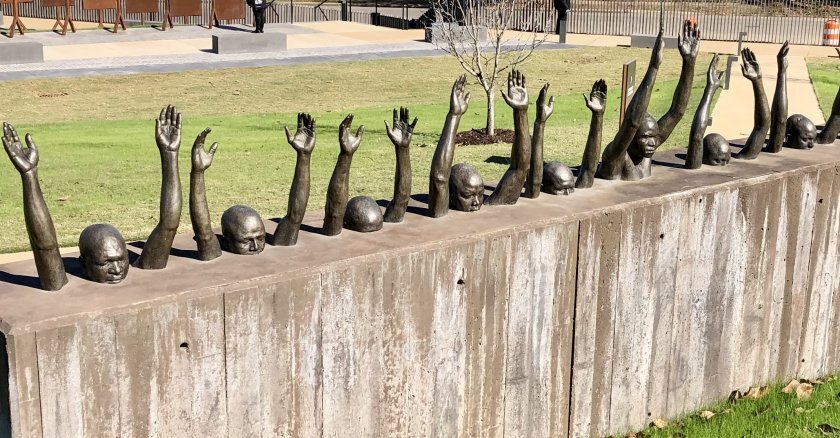Yet after this exhilarating trip, I continue to hold mixed feelings about the way some cities have been able to monetize their past by turning the sites of tragic events associated with civil rights into tourist destinations. Above all, how much of the revenue from this tourism benefits residents who still live in impoverished situations? More specifically, why are there so many blues musicians desperately in need of steady work, pensions and health care if they and their music are as important to the economies of the region as public officials claim? And why aren’t we working harder to preserve the blues as a form of original American music?
It goes without saying that civil rights museums like the Lorraine Motel in Memphis, where we stopped on our way to the Delta and where Martin Luther King Jr. was assassinated in 1968, as well as the Museum of African American Culture and History in the historical Black town of Mound Bayou, Miss., help preserve important history that otherwise might be lost or forgotten. But Clarksdale, Miss., despite the poverty that remains, has dealt with its cultural and historical associations in a fairly unique way: It has taken its history of being the birthplace of the blues and fused it with the civil rights history of the region, a history that includes the lynching of Emmett Till in 1955 and the assassination of Medgar Evers in 1963.
Some of this history is personal to my family. My wife’s father was born in the small town of Lexington, Miss., a few miles from the eastern border of the Delta. Like many other Black Americans, after World War II he migrated to Chicago to find work. During the summer months on vacation, the family would travel back to the Delta to visit relatives living in Lexington, Tchula and Jonestown. Nisha remembers those trips vividly. Her mother, knowing there would be few restaurants that would serve Blacks along the way, would fry chicken, put it in a waxed-paper-lined shoebox and pray that no one would need to use a bathroom when passing through areas of the South where Blacks were barred from facilities used by whites.
This trip for Nisha conjured up memories of the joy of her childhood, running barefoot through the dirty sands from the Mississippi River. But they also brought to surface the humiliation of having to drink out of “colored” water fountains and sit in the balcony to take in movies at the Paramount Theatre in Clarksdale. She recalls having to climb up dangerous, flimsy metal steps to enter the segregated balcony. (Of course, white patrons entered through the front doors and sat in the orchestra sections.)
On the second day of our trip, as blues harmonica virtuoso Deak Harp performed an impromptu 30-minute concert at his store in Clarksdale, Mississippi native and recording artist Charlie Musselwhite happened to drop by. They remembered the bigoted history of the Paramount and directed Nisha on how to get to the theater, where those metal steps still exist.
Seeing those worn and weathered steps for the first time in 60 years, Nisha wept. The sight of them had triggered painful memories that she had buried all those decades. Some in our diverse delegation, ranging in age from 27 to 74, didn’t understand why looking at some rusty old steps would move her so deeply. They also giggled the next day when a catfish leaped out of the otherwise still water of the Tallahatchie River near where Emmett Till’s body was discovered.
Their reactions drove home to me that while this history is uncomfortable and often ignored, it must be taught. Just being in the Delta and seeing how the music and the area’s history affected both Blacks and whites underscored the need to teach Black history, in controlled academic settings with skilled teachers, so that both Black and white students could learn how racism worked in the past, how it functions today and what we need to do now to eliminate it forever.
Given this necessity, I find it both ironic and hypocritical that some conservative legislators are making it difficult for teachers to discuss their states’ true racial histories, while finding no harm in municipalities like Clarksdale, Mound Bayou and other places profiting from tourism connected to that history.

Today, the store is crumbling and the owners — descendants of one of the jurors who acquitted Bryant’s husband and brother-in-law of Till’s murder — are asking $4 million for the property. The nonprofit Emmett Till Interpretive Center has been trying for more than a year to gain control of the store to turn it into a museum. The center is also close to inking a deal to purchase the shed where Till was beaten and tortured, according to Venita Halbert, the center’s community engagement coordinator.
I believe that in instances like this local governments, using eminent domain and paying fair market value, should seize control of facilities and turn them over to organizations like the Interpretive Center. I know there might be constitutional issues involved, but governments should explore this and other options because it is morally wrong for descendants of segregationists to be able to blatantly profit from the racist actions of their ancestors.
By the end of the trip, I was tired, mad and frustrated that I could do little more than leave a tip here and there, purchase locally from the few Black businesses remaining and groove to the music blues singers like Terry “Big T” Williams and Terry “Harmonica” Bean adeptly performed. Their music transported me to another place and time. And as I thought of them, I recalled a line from one of my favorite B.B. King songs: “I like to live the love that I sing about in my song.”
Governing's opinion columns reflect the views of their authors and not necessarily those of Governing's editors or management.
Related Content














